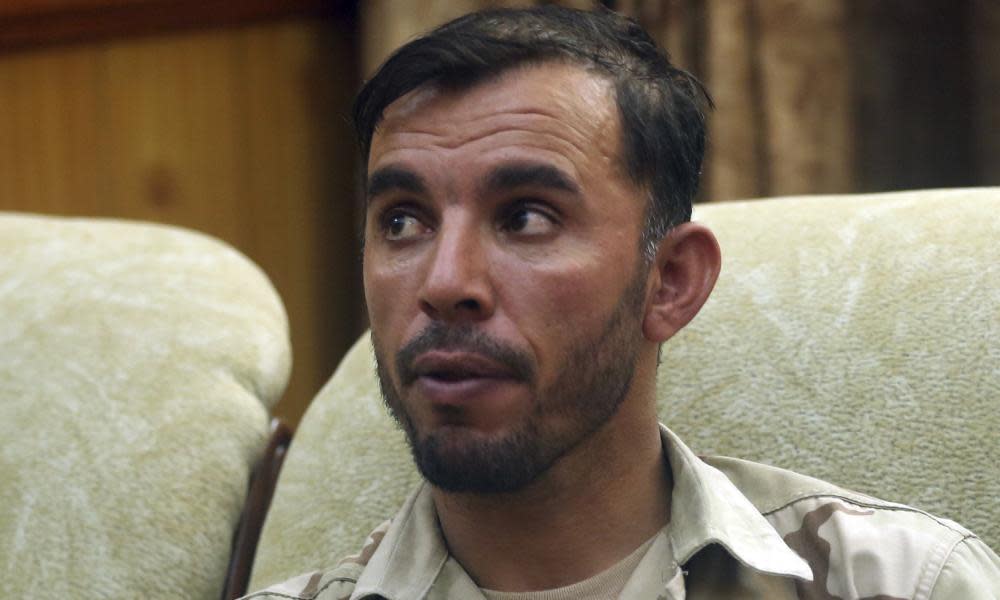Afghanistan postpones Kandahar elections after police chief killed

Afghanistan has delayed parliamentary elections in southern Kandahar province for a week after a rogue bodyguard gunned down the regional police chief, Abdul Raziq, and killed or injured most of the province’s political and security leadership.
The city was tense and quiet on Friday, usually the busiest day of the Afghan weekend, as the remaining leadership organised the funeral and burial of a strongman who had for years defined the city.
Raziq had brought improved security to Kandahar, frequently flying out to the frontline to fight the Taliban directly. This military prowess made him a top target for the insurgents and popular with many pro-government Afghans.
“People here are very silent,” said Yousef Youniai, a member of the provincial council. “A shadow of grief is over the city, no one is out on the streets, and if you talk to people, they start crying.”
But he was also accused of corruption and serious human rights violations, and the UN had called for his prosecution for alleged torture and enforced disappearances.
His death is likely to spell more instability for southern Afghanistan, analysts warned, because he amassed powers and authority that belied his official title of provincial police chief.
Thomas Ruttig of the Afghanistan Analysts Network wrote: “Relying on single charismatic, if brutal individuals to keep order will always leave the Afghan state vulnerable if that individual is killed.
“Raziq’s rule drove the insurgency, but also contained it.”
The delay to parliamentary elections set for Saturday makes Kandahar the second province where polling will not go ahead. Officials had earlier said there would be no voting in eastern Ghazni.
The Taliban, who claimed responsibility for killing Raziq, have condemned the elections and vowed to disrupt them. About 54,000 police and army personnel have been deployed to protect the vote, but insurgent attacks have already hit campaigns.
So far 10 candidates have been killed in attacks in the run up to voting day, and hundreds of civilians killed or injured. Security concerns mean over a quarter of Afghanistan’s 7,355 polling stations will not open on Saturday.
In urban areas with some security, particularly the capital, Kabul, there has been enthusiasm about the vote despite violence and chronic corruption. Many of the candidates are young, educated and running for the first time, promising to bring change to a fraud-ridden system.
But the delay to voting in a city that is the cultural and political heart of Afghanistan’s south, and was the birthplace of the Taliban, will be a big blow to credibility.
That is particularly damaging to the government this year, as the polls are meant to be a test run for even more high-stakes presidential polls due next year. Even if voting on 20 October goes smoothly, security forces will face a second test next week when they try to hold the rescheduled Kandahar vote.
“It was a good decision to postpone the election at this moment. It’s an emergency situation here,” Bashir, one resident of the city, told the Guardian by phone. “No one is out … cars and motorcycles are banned in the city, there is heavy presence of security forces, and in some places they blocked the roads.
Raziq’s funeral prayers were held at the city’s most sacred shrine, said to hold the cloak of the prophet Muhammad, as the provincial governor and other officials fought for their lives in hospital.
The gunman was shot dead at the scene, but the interior ministry said they had arrested three other people, as details of the attack emerged.
The attacker opened fire at the end of a meeting, as delegates gathered for a group photo, according to a Associated Press television cameraman.
Everyone scattered, and the US participants scrambled toward their helicopter, but when Afghan police tried to stop them, a firefight broke out, the reporter said.
In Kabul the top US general serving in Afghanistan went to talk to Afghan troops on the streets, to boost morale or perhaps dispel rumours circulating online that he too had been badly hit in the attack.
“It was a very close confined space. But I don’t assess that I was the target,” Gen Austin Scott Miller told Afghan Tolo TV channel.
“We will continue our support. My message to the people of Afghanistan has been very consistent: you have every right to be proud of your security forces and the preparations that made for this election despite this unfortunate event, tragic event down in Kandahar.”
In Kandahar there was anger as security blocked some mourners from reaching Raziq’s funeral, and some officials demanded his brother immediately be named to replace him as the head of provincial police forces.
“After many loud discussions, they decided to start the funeral and talk about the general’s brother tomorrow,” said local MP Khalid Pashtoon.
“The delay was a good decision because some people lost their confidence, not only because of the general’s [Raziq’s] death but also because the Taliban released leaflets in some places warning the people against the election. And this one week will offer a good time to rebuild that confidence.”

 Yahoo News
Yahoo News 
